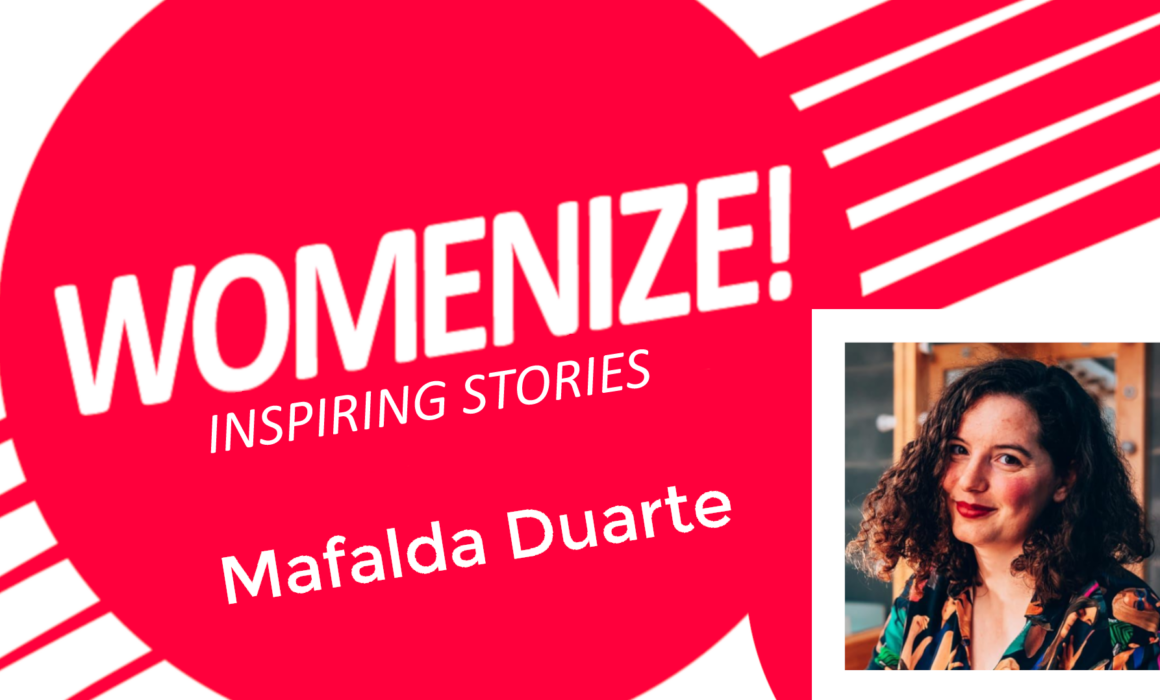Mafalda Duarte – Womenize! – Inspiring Stories
Womenize! – Inspiring Stories is our weekly series featuring inspirational women from games and tech. For this edition we talked to Mafalda Duarte, Studio Director and Producer at Telescope Games. She speaks challenges and opportunities in the Portuguese game scene through community work, and underscores the importance of communication, respect, empathy, and vision for effective leadership in game development. Read more about Mafalda in this interview:
Hi Mafalda! From your background in Multimedia Art to your current role as Studio Director and Producer at Telescope Games. Can you share a pivotal moment or project that helped you transition into the gaming industry, and how your artistic background has influenced your work in game development?
I always wanted to become an artist and make projects bigger than myself. That artistic journey led me to art multimedia as a path to explore creativity in different mediums: photography, video, audio, design, and particularly animation. I loved how animation felt like breathing life into art, creating movement out of pencil strokes, and the collaborative aspect of an animation project. I wouldn’t say I had one pivotal moment in the gaming industry, but three key steps led me to the path I am on now.
The first was playing Lume by State of Play. This was the moment I realised the traditional animation skills and craft I was developing could be translated into games, and were, in fact, already being translated into games. Games were art, and I COULD make games.
The second was having people already in the industry welcoming me in. When other creative friends who crossed into games started to invite me to their projects, game jams, conferences and meetups, I felt like I BELONGED in the game industry.
And the third was accepting I was already MAKING games. My first job at Leleh Land as an interactive designer taught me a lot of the same logic of game design, how to guide the players and make interactions meaningful, fun and engaging while accessible.
Through these experiences, I developed an inclusive perspective of what video games can be, using my art background to explore references beyond games for myself and my teams, always pushing for accessibility, inclusion and diversity, in our techniques, stories, gameplay and audiences.
As a founder of Game Dev Lisbon and your activism in the Portuguese game development ecosystem, you’ve been deeply involved in community building. What are the key challenges and opportunities for game developers in Portugal, and how has your community work contributed to the growth of the industry?
The game development ecosystem in Portugal becomes more vibrant each day. Digital nomads and expats moving in, more international game studios setting new offices, consolidation of national movements and efforts into a game developer association, and a new incubator are part of the reasons our local industry is getting stronger.
However, our local industry still faces several challenges, such as limited access to funding, a need for more visibility on the international stage, and the need for a stronger support network for emerging developers. Nevertheless, these challenges also present opportunities for growth and innovation.
Through Game Dev Lisbon, we’ve focused on building a supportive community where developers can share knowledge and resources, and collaborate. Our initiatives, such as meetups, conferences and game jams, have aimed to enhance skill development and foster collaborations. We’ve also worked on creating platforms for Portuguese games to gain international exposure, like the Spotlight Magazine and the Spotlight Awards. Our efforts have contributed to a more cohesive and dynamic industry, with an increasing number of Portuguese games gaining recognition worldwide. This growth not only showcases the talent within Portugal but also attracts new talent and investment to our ecosystem.
As both a Studio Director and Producer, what do you believe are the most important qualities or skills that a leader should possess to foster a creative and successful development environment?
For me, leading a creative and successful development environment requires a blend of strong communication, mutual respect, empathy, and high-level vision. Sure, understanding the game development process is crucial, but so is the ability to inspire and motivate your team. As a leader, I aim to foster an environment where people feel like they belong, creativity is encouraged and where failure is part of the process and the learning experience of the team, towards the betterment of their skills, our game, and ultimately the studio.
This is difficult to manage. There are deadlines to reach, a budget to maintain and our human limitations. But as a leader, my experience is that if you share your limitations and struggles with the team, and respect their expertise, they will step up to support you as much as you support them. That mutual respect, with open communication channels, helps us resolve conflicts quickly and expect the best out of each other. Although a very vulnerable and personal process, I find that, for the teams I have worked with, this creates a culture of trust and respect, which is fundamental for collaboration and creativity.
The last key aspect of creating this environment is to have a strong vision. A leader should play and know games, understand the current trends, and stay informed about the overall state of the industry. They must be able to not only predict where the industry is heading, but also embrace and adapt to new methodologies while championing innovative projects and practices. A leader never stops learning. Balancing these qualities can create a dynamic and productive environment where creative visions become reality.
Thanks for this interview, Mafalda!
Mafalda’s links: LinkedIn
Womenize! – Inspiring Stories Feature by Madeleine Egger

